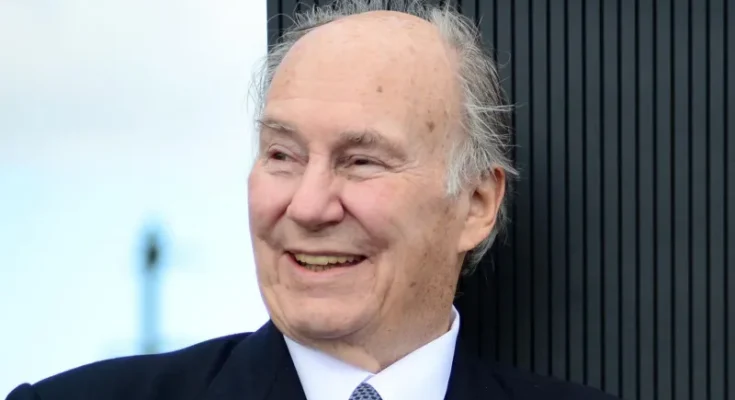Billionaire philanthropist and revered spiritual leader Aga Khan has passed away at the age of 88, the Aga Khan Development Network (AKDN) announced.
Prince Karim Aga Khan IV, the 49th hereditary imam of the Ismaili Muslim community, traced his lineage directly to the Prophet Muhammad. According to a statement from his charity, he “passed away peacefully” in Lisbon, Portugal, surrounded by his family.
A Life of Leadership and Legacy
Born in Switzerland, Aga Khan held British citizenship and resided in a château in France. Over the decades, he built a global reputation for his humanitarian efforts, guiding his vast network of charitable initiatives in healthcare, education, and cultural development—primarily in the developing world.
King Charles III is said to be deeply saddened by his passing. The Aga Khan shared a close friendship with both King Charles and the late Queen Elizabeth II, and the British monarch is reportedly in private contact with the family.
A Philanthropist With a Global Impact
As the leader of the 15-million-strong Ismaili Muslim community, Aga Khan oversaw the expansion of numerous humanitarian projects, including hospitals, universities, and cultural institutions worldwide. His Aga Khan Development Network continues to operate across Asia, Africa, and the Middle East, improving the lives of millions regardless of religion or background.
Despite his dedication to philanthropy, he was also known for his luxurious lifestyle, owning a private island in the Bahamas, a super-yacht, and a private jet.
In a statement, the Aga Khan Development Network expressed its condolences, reaffirming its commitment to carrying forward his vision:
“We continue to work with our partners to improve the quality of life for individuals and communities across the world, as he wished, irrespective of their religious affiliations or origins.”
The Ismaili Muslim community, which has significant populations in Pakistan, India, Afghanistan, and Africa, now mourns the loss of a visionary leader whose legacy will continue to shape the future.

A Legacy of Leadership and Equestrian Excellence
Prince Karim Aga Khan ascended to the role of imam of the Ismaili Muslims in 1957 at just 20 years old, following the passing of his grandfather. Over the decades, he not only became a spiritual leader but also a shrewd businessman and a passionate patron of horse racing.
By 2008, Forbes estimated his fortune at $1 billion (£801 million), accumulated through inheritance and diverse business ventures, including a highly successful horse-breeding empire.
The Rise and Tragic Loss of Shergar
Aga Khan became one of the most influential racehorse owners and breeders in the UK, France, and Ireland. His greatest triumph came with Shergar, the legendary thoroughbred that captivated the world.
In 1981, Shergar made history, winning the Epsom Derby by an astonishing 10 lengths while wearing the Aga Khan’s signature emerald green racing silks with red epaulets. The victory cemented Shergar’s reputation as the most famous and valuable racehorse of his time.
However, tragedy struck in 1983, when Shergar was kidnapped in Ireland and never recovered. Despite the devastating loss, the Aga Khan remained committed to his Irish breeding operations. Speaking to the BBC in 2011—on the 30th anniversary of Shergar’s iconic Derby win—he reflected on the ordeal but affirmed that he never considered abandoning the sport he loved.

A Champion in Racing and Humanitarian Efforts
Reflecting on Shergar’s legendary victory at the 1981 Epsom Derby, Prince Karim Aga Khan described it as an unforgettable moment:
“It’s a memory that can never, never go away. I’ve watched that film tens or even hundreds of times, always trying to analyze where this remarkable performance came from. Every time I see it, I feel like I’ve learned something new.”
He spoke of the sheer dominance of Shergar’s performance:
“If you’re in racing, the Epsom Derby is one of the greats. Winning it is an extraordinary privilege—but to win the way he did was something else entirely.”
Despite the tragic kidnapping of Shergar in 1983, the Aga Khan remained deeply committed to horse racing. He went on to win the Epsom Derby four more times, with:
- Shahrastani (1986)
- Kahyasi (1988)
- Sinndar (2000)
- Harzand (2016)
Among his greatest triumphs was the 2008 Prix de l’Arc de Triomphe, won by the brilliant unbeaten filly Zarkava.
A Legacy Beyond the Racetrack
Beyond his equestrian success, the Aga Khan dedicated his life to philanthropy and cultural preservation. He founded the Aga Khan Foundation, supporting projects in education, healthcare, and architecture. His contributions include:
- Aga Khan University in Karachi
- Aga Khan Program for Islamic Architecture at Harvard University and MIT
- Aga Khan Trust for Culture, which played a key role in the restoration of Humayun’s Tomb in Delhi
- The Aga Khan Award for Architecture, recognizing excellence in the field
He also transformed media in Africa, founding Nation Media Group, now the largest independent media organization in East and Central Africa.
Global Tributes to a Visionary Leader
World leaders and humanitarians have paid tribute to the Aga Khan’s extraordinary impact:
🇵🇰 Pakistan’s Prime Minister Shehbaz Sharif:
“A man of vision, faith, and generosity… Through his tireless efforts in poverty alleviation, healthcare, and gender equality, he championed the cause of the marginalized, leaving an indelible mark on countless lives.”
🎗️ Nobel Prize laureate Malala Yousafzai:
“His legacy will continue to live on through the incredible work he led for education, health, and development around the world.”
🌍 UN Secretary-General Antonio Guterres:
“A symbol of peace, tolerance, and compassion in our troubled world.”
Prince Karim Aga Khan’s legacy extends far beyond his spiritual leadership, leaving a lasting imprint on humanitarianism, culture, and global development.



